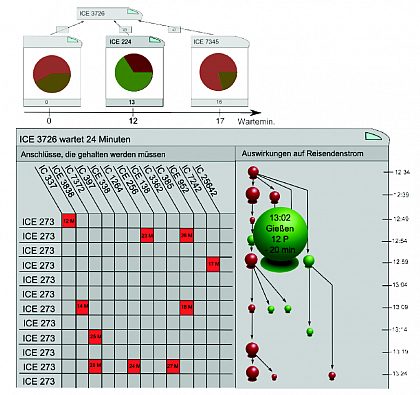Links
Documents
Technical Report 2011/2: Passenger Flow-Oriented Train Disposition
download.php?down=19300&elem=2458678
(externe Datei)
Contact
Prof. Dr. Matthias Müller-Hannemann
phone: +49-345-5524729
fax: ++49-345-5527039
room 4.19
Institut für Informatik
Martin-Luther-Universität
Halle-Wittenberg
Von-Seckendorffplatz 1
06120 Halle (Saale)
Email:
matthias.mueller-hannemann
AT informatik.uni-halle.de
oder
annabell.berger AT informatik.uni-halle.de
Login for editors
Passenger-Friendly Train Disposition
Delay and disposition management is about waiting decisions of
connecting trains in a delay scenario: Shall a train wait for passengers from a feeding train or not? Classic delay management (Schöbel 2007)
solves a global and static optimization problem. It thus makes simultaneous decisions for all stations and in particular even for several hours ahead. This has two drawbacks: it is hardly realizable in daily operation as it modifies the planned schedule at too many places. Moreover, it works with the fictitious assumption that the future is completely known at the time of decision, whereas additional primary delays will repeatedly occur. Our approach tries to avoid these shortcomings: The dispatcher is still responsible for local decisions, but he shall now use a kind of global optimization.

Example: Effect of a waiting decision on passenger flows (Design by Katrin Wüstefeld, developed in her diploma thesis)
We propose a new model for real-time train disposition aiming at passenger-friendly optimization. The idea is that disposition decisions shall be based on the effect of the passenger flow. A major challenge is to find an appropriate objective function, and this issue deserves further discussion in the future. In our investigations we took a pragmatic view and evaluated three different objective functions: (1) overall lateness at the destination, (2) deviation of planned passenger numbers in trains from the realized ones, and (3) number of passengers which do not reach their destination (within reasonable time).
Up to now, our major concern was efficiency: Is it possible to achieve passenger flow updates fast enough to be used within an online decision support system?
Based on our experiments, conducted with the complete German train schedule, relatively large passenger flows (up to 16000 origin-destination pairs), and several delay scenarios, we achieve update times of several seconds.
Our findings are summarized in the Technical Report 2011/2. An extended abstract appears in Proceedings of ESA 2011.

